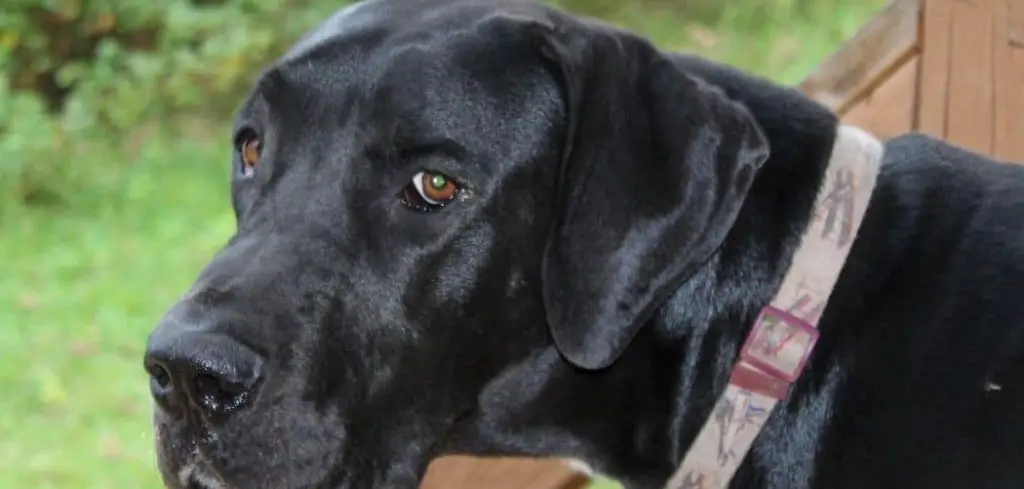When a dog has a swollen belly and is panting heavily, it can be alarming for any pet owner. These symptoms can signal anything from digestive issues to serious, life-threatening conditions.
We outline the common reasons why dog panting with a big belly happens, what you can do at home, and when to seek veterinary help.
Table of Contents
Dog Panting and Big Belly — Why It Happens
Dog panting combined with a swollen belly is often a sign that your dog is experiencing discomfort or distress. This can be due to bloating from gas buildup, fluid accumulation in the abdomen, heart problems, organ enlargement, or internal bleeding.
Pain, anxiety, or respiratory distress can make panting worse, while swelling in the belly may indicate an urgent medical problem that needs prompt attention.

Dog Panting and Big Belly: Common Causes
Gastric Dilatation-Volvulus (Bloat)
Bloat is a life-threatening emergency where the stomach fills with gas and twists on itself.
The swelling can rapidly distend the belly, causing pressure on the diaphragm and making breathing difficult, which leads to panting.
Dogs with bloat often appear restless, drool excessively, and try to vomit without bringing anything up. This condition requires immediate veterinary intervention.
Read more: Dog Panting and Biting (Here’s why)
Ascites (Fluid Accumulation)
Ascites is the buildup of fluid in the abdominal cavity, often due to liver disease, heart failure, or cancer.
The fluid causes visible swelling in the belly and may make your dog breathe faster or pant as the pressure affects the lungs.
While not always as instantly life-threatening as bloat, ascites can be a sign of serious underlying illness that needs urgent diagnosis.
Heart Disease
Heart problems, such as congestive heart failure, can lead to fluid buildup in the abdomen and lungs.
This fluid retention can cause both panting and a distended belly, along with reduced activity and coughing.
Because heart disease can progress quickly, early detection and treatment are critical.
Internal Bleeding
Trauma, ruptured tumors, or certain clotting disorders can lead to internal bleeding.
Blood collecting in the abdomen causes it to swell, while panting can occur due to shock and reduced oxygen delivery to tissues.
Internal bleeding can worsen rapidly, so any sudden swelling with weakness and pale gums should be treated as an emergency.
Pregnancy or Labor Complications
In pregnant dogs, a big belly is normal, but excessive panting outside of labor may indicate discomfort, overheating, or complications.
If panting is paired with distress, restlessness, or signs of pain, a vet check is important to ensure both mother and puppies are safe.
Obesity
Carrying excess body weight can cause a chronically distended abdomen and increase the effort required to breathe.
Overweight dogs may pant more, especially during warm weather or mild exertion.
While obesity isn’t an immediate emergency like bloat, it significantly affects a dog’s long-term health and comfort.
What to Do If Your Dog Is Panting and Has a Big Belly
If your dog’s symptoms appear suddenly and they seem distressed, treat it as an emergency and head to a vet immediately. Quick action can be lifesaving in cases like bloat or internal bleeding.
For less urgent but still concerning cases, keep your dog calm and limit activity while you arrange a veterinary appointment.
Ensure they have access to fresh, cool water, but avoid giving large amounts of food or water until a vet advises.
If obesity is a factor, work with your vet on a safe weight-loss plan rather than restricting food abruptly.
Monitor for changes in breathing, behavior, or belly size, and keep a record to share with your vet.
When to Call or Visit Your Vet
Seek immediate veterinary attention if your dog has a big belly and is panting along with:
Sudden swelling and distress
Attempting to vomit unsuccessfully
Weakness or collapse
Pale or bluish gums
Rapid worsening of symptoms
Even if your dog seems stable, persistent or unexplained swelling with panting should be checked promptly. Conditions like heart disease or ascites benefit from early treatment before complications set in.
Read more: Dog panting excessively (Here’s why)
Key Takeaway
Panting with a swollen belly in dogs can range from uncomfortable to life-threatening. While some causes develop gradually, others—like bloat—require immediate emergency care.
Always err on the side of caution and have your dog evaluated by a vet if these symptoms appear. Acting quickly can protect their health and give you peace of mind.
